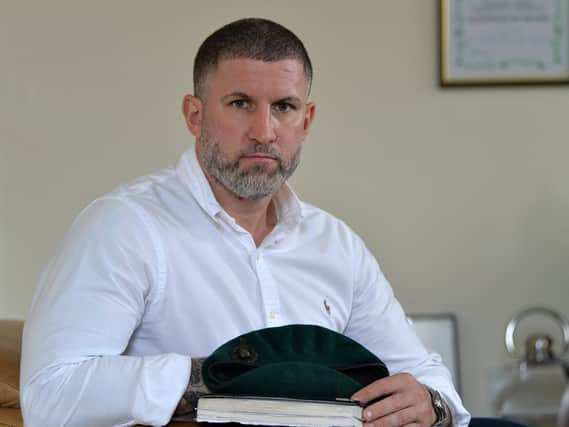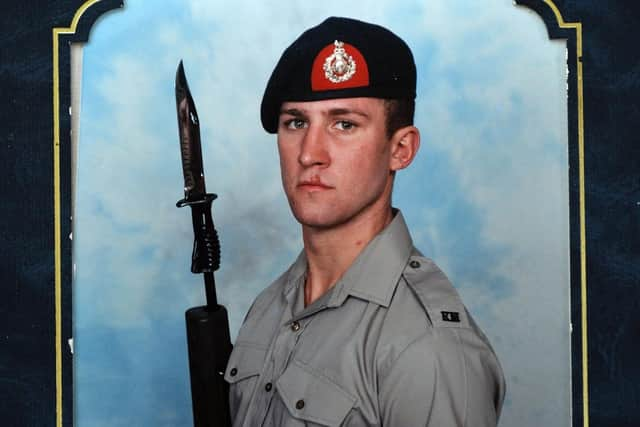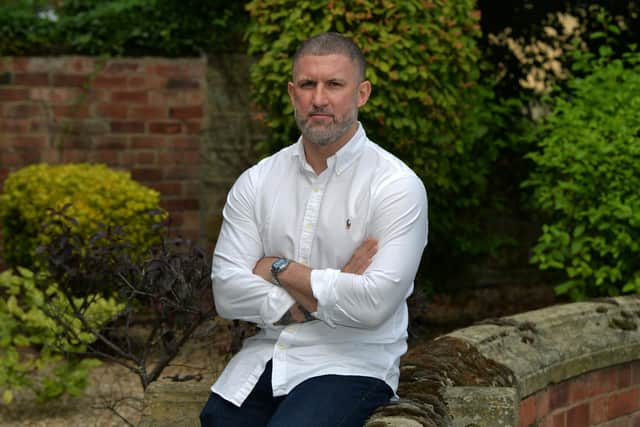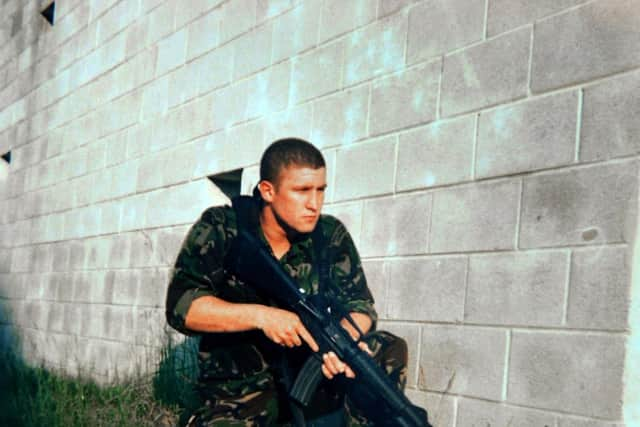Meet the Yorkshireman who walked away from Leeds Rhinos to become a Royal Marines Commando


When 20-year-old Gareth Timmins set off from Yorkshire to Devon to begin the notoriously-difficult training course to become a Royal Marines Commando, his mum gave him the unexpected present of a new diary.
Seventeen years on, the daily observations he jotted down as he and his fellow recruits were pushed to their physical and mental limits has formed the basis of a unique new book.
Advertisement
Hide AdAdvertisement
Hide Ad“When I was on the platform at Wakefield Westgate, my mum gave me a diary and said, ‘Just write things down, anything, it’ll help you cope’,” the now 37-year-old Timmins recalls over Zoom ahead of last week's publication of his book Becoming the 0.1%.


“It was quite possibly the most bizarre gift she could have given me. At that time, I wasn’t remotely academic nor did I write anything or read anything. I took it, somewhat confused, and got on the train. I was just feeling really nervous and it is five or six hours on your own to get down there. It is kind of like you are on a rollercoaster you can’t get off. I just opened the diary and just wrote that down, how I was feeling.
"From that moment on I just felt absolutely compelled to keep it. Sometimes when we’d had no sleep whatsoever for four or five days on the bounce, writing something was incredibly difficult but I just felt like a burning sensation that it was something I had to do. I couldn’t sleep unless I had done it.”
The book’s title is a reference to a famous advertising campaign for the Marines which stated ‘99.9% Need Not Apply’ in reference to the statistic that only one in 1,000 applicants to join them would complete training and receive a coveted Green Beret.
Advertisement
Hide AdAdvertisement
Hide AdIt not only features extracts from the diary, but also Timmins’ reflections almost two decades on as well as 34 lessons in how to develop an elite mindset – one for each of the weeks he was on the course.


Military career began after walking away from rugby league
Timmins’ quest to beat the odds came at a pivotal moment in his life. As a teenager growing up in Hemsworth he had been a talented rugby league player and was offered a contract by Leeds Rhinos but took the tough decision to turn it down due to its poor financial terms. After that disappointment, Timmins fell into drink and drug-taking and was even charged with ABH and affray after being involved in a pub fight.
He was among just 16 of the 60 recruits to make it through the gruelling initial three-day Potential Royal Marines Course. Those who passed made it onto the formal Commando Training Course – normally a 32-week process but which was extended for a fortnight for their group because of an initial lack of enough successful recruits.
Timmins initially kept his diary a secret. “On my 21st birthday, the training team ripped all my cards up and said there were no birthdays in the Marines for recruits. I thought if they found the diary they would rip it to pieces. I was really protective of it and I would sneak it in the field or even write notes on my arms and my hands that I would transcribe to the diary later. They eventually saw it but to my surprise they said it was absolutely amazing and really got behind it.”


Advertisement
Hide AdAdvertisement
Hide AdThe book provides a fascinating first-hand account of the rigours of training, including learning the ‘wet and dry’ routine involving changing in darkness from wet clothes into dry clothes before getting in a sleeping bag in order to prevent hypothermia on real operations. Recruits would be woken in the middle of the night for sentry duty and be required to put back on their cold, wet clothes – something Timmins writes was “a process that breaks even the strongest of minds eventually”.
“Come winter, and it becomes a whole new beast altogether: recruits can be seen smashing frozen trousers off trees to get them on – it is one of the most brutal things anyone can experience during training – especially when you can be sat in them for hours until they eventually dry off during the winter months,” he adds.
It also reveals the special moments of comradeship along the way - including a surprise Christmas party thrown from the recruits after an exercise in which they captured a fort.
“We got led into this dark room and all these Christmas lights came on. There was some mulled wine and rum and we ended up singing Christmas songs. It was just a really magical experience that all the lads who were there remember to this day.”
Advertisement
Hide AdAdvertisement
Hide AdThe book also reveals how Timmins would often return to his old ways of drink and drug-taking while on leave from training back home in Yorkshire.
He says despite it being uncomfortable to revisit, he felt it would have been wrong to leave out of the book.
“I want to put my arms around my younger self and reassure my younger self that everything is going to be alright. I was just shellshocked from the rugby disappointment and dealing with a lot of demons. I shudder at some of the things I used to do when I was younger and when I was reading it out for the audiobook, it was uncomfortable for me to read it out, knowing there were people listening. But I had to be honest with some of the stuff I did. The diary is so raw and honest alluding to how bad I’m feeling. Without the true context you don’t get a full picture. I didn’t want to omit it because it would have just painted an unrealistic picture of that year. But I was so close to sabotaging what was a massive undertaking.”
He says writing the diary at the time was subconciously something of a motivational tool.
Advertisement
Hide AdAdvertisement
Hide Ad“Maybe it was a real anchor of stability on that journey. If I wrote half a diary and left that would have been an awful reminder of failure. Once you have got a couple of weeks in, you want to see it through."
He says completing the course was an incredibly emotional moment.
“You never know you are going to complete training until you do the last 30-mile exercise. You have this daily burden of failure on your shoulders - it is daily and it is oppressive. It is almost like this big heavy jacket on pulling you down.
“How they have engineered that course is that no matter who you are, how much self-confidence you have got, how strong you are mentally and physically, you don’t know you can do it until you have actually done it.”
Book dedicated to comrades who died in Afghanistan
Advertisement
Hide AdAdvertisement
Hide AdBut that joy was tempered by the warning given to him and his fellow new Commandos that of the 11 remaining original troop members, statistics suggested two or three would be killed or seriously injured within a year. That warning would prove tragically accurate. Within three years, three of his fellow recruits – Tom Curry, Ben Whatley, and Ben Reddy – were killed in Afghanistan and Timmins has dedicated the book to them.
He says witnessing the Taliban return to power has been “absolutely tragic” for multiple reasons.
“I went in a hostile close protection role in 2013 and spent a year in Kabul. We were working with interpreters and everyone you spoke to would say, ‘We don’t want the Americans to leave us’. That was one of their major concerns and it has happened in the most brutal of ways you could ever imagine, really. We were on our way to creating a democracy and the equality the women were getting and have now lost is one of the most tragic aspects of it. It is just incomprehensible and unfathomable that after 20 years of massive investment in time, finance and everything else it would appear it has gone to nothing.
“Twenty years of occupation had started to have an effect. Certainly Kabul was on its way. But you need another 80 years on it - that’s the reality. Where’s the money coming from and where’s the time? Do we keep putting people in harm’s way for this? When I was there and I experienced the exact same thing in Iraq, it is like we are putting a plaster over a gaping wound.”
Advertisement
Hide AdAdvertisement
Hide AdTimmins spent five-and-a-half years in the Marines before taking the decision to work in private security in posts that underlined the value of his Commando training.
“It helps you beyond belief. In 2011 I went out to do counter-piracy operations privately in Somalia as the team leader of a four-man team. We got attacked about 10 or 11 skiffs of pirates. We went through the processes we had been taught automatically. That one moment is the greatest testament to who we are as Royal Marines. The odds were stacked against us but we prevailed and we took no casualties and protected the ship and the crew.
"You 100 per cent back yourself, you back yourself wholeheartedly. The training allows you to find the true innermost workings of yourself, what you thrive on but also what you really don’t like. When you have explored both frontiers, you can control your emotions better. That allows you to go into places like Afghanistan and Iraq because you understand the dynamics of war but also you understand yourself.
“I don’t know who designed the course but how they take a young lad at the start of training and produce an elite soldier at the end is one of the most remarkable transformations you can witness.”
Advertisement
Hide AdAdvertisement
Hide AdIn recent years, he also juggled working abroad and in roles like protection for wealthy individuals in London with studying an Open University degree in forensic psychology.
“I did year one in Egypt, year two in Somalia, year three in London, and year four and year five literally on the dashboard of my car while we were renovating my house. I did it all over the world. It was really tough but it was the best thing I have ever done. I was absolutely fascinated by it and even on my time off in summer I would read book after book on psychology. That is what allowed me to do this book justice. I absolutely love it.”
Battle to get diary published
In common with so much else in Timmins’ life story, getting his book published was also an against-the-odds success.
He says the diary had been literally gathering dust on his book shelf when he made an initial attempt to start turning it into a book a decade ago.
Advertisement
Hide AdAdvertisement
Hide Ad“I always had this nagging thing that I needed to bring it to life,” he says.
But he failed to get it off the ground and then was encouraged by one of his clients to attend a convention by motivational speaker Tony Robbins, who touched a nerve with Timmins by telling the audience they all had one thing they knew they should be doing but weren’t.
“After that I made a commitment to myself to do it. It took me six months to type it all up. But then I hit massive adversity in knowing what to do next in terms of getting it published.”
After being rejected by around 50 literary agents, one advised him to restructure it around 34 lessons on developing an elite mindset.
Advertisement
Hide AdAdvertisement
Hide Ad"I more or less locked myself in the house for three months and just typed from 6am in the morning until 1am in the morning. I was just flat out. After that, I submitted and then it was ready to approach publishers.
“It ended up getting multiple publishing offers, which was just incredible.”
The book ended up being picked up by Hodder, one of the country’s biggest publishing houses, and in addition to the print version an audiobook has also been created - part-read by Timmins himself and partly by an actor called Ben Heathcote who plays the younger Gareth and reads the diary entries.
In common with many books about military life, Timmins’ book had to be signed off by the Ministry of Defence to ensure no sensitive information was given away - and to his delight, they eventually approved it without any changes.
Advertisement
Hide AdAdvertisement
Hide Ad“Unbelievably they didn’t change anything. It is one of the greatest coups ever because now you can read exactly what it is like, it has not been watered down at all.”
Timmins currently lives in Pontefract and has several business ventures on the go, including a training programme for potential military recruits.
He says writing this book has allowed him to finally put any lingering disappointment about the rugby league career that could have been behind him.
“I really struggled with it until I was about 30. I always kind of viewed it as a massive failure even though I did in theory walk away from it with an offer of a kind on the table. I used to have dreams every now and again I was walking out to play rugby. They were really vivid dreams that used to feel completely amazing. And then I would wake up and it wasn’t real. It never felt good.
Advertisement
Hide AdAdvertisement
Hide Ad"All of a sudden I had started getting on with the book and it was almost like I had put it to bed and the dreams stopped. It was really weird.
"Now I wouldn’t change a thing. I absolutely now think it was meant to be. I’m really grateful for where I am now.”
Savile visit left a sour taste
The diary also gives an insight into the young Timmins being an astute judge of character going by his entry when Jimmy Savile came to visit the recruits.
It reads: “He’s quite funny, but has an arrogant side to him – maybe a **** bloke if I’m honest?”
Advertisement
Hide AdAdvertisement
Hide AdHe reflects today: “Jimmy Savile was an honorary Green Beret. He got it for all his services for charity. We were all queuing for a fast food stall and he rocked up with a green beret on his head and a pink tracksuit and all this jewellery and he was just a disgusting bloke.
"He was just a really vile character, so ignorant and so rude. He immediately pushed in front of all the lads who had just got out of the field and were queueing up for food. He just made some really poor comments and walked off.”
Support The Yorkshire Post and become a subscriber today. Your subscription will help us to continue to bring quality news to the people of Yorkshire. In return, you'll see fewer ads on site, get free access to our app and receive exclusive members-only offers. Click here to subscribe.
Comment Guidelines
National World encourages reader discussion on our stories. User feedback, insights and back-and-forth exchanges add a rich layer of context to reporting. Please review our Community Guidelines before commenting.